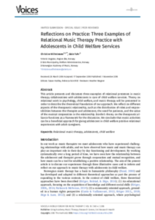Displaying 71 - 80 of 111
This article presents and discusses three examples of relational processes in music therapy collaborations with adolescents in care of child welfare services.
In this paper, the authors examine if and how care order proceedings could be improved in England, Finland, Norway, and California, USA, asking the judiciary decision‐makers about their views on what should be improved.
The aim of this study is to examine whether youth in foster care receive services according to need, by using a multi-informant design.
This study explores Norwegian child welfare workers' perceptions of long‐term cases resulting in emergency placements.
This article presents findings from a cross-national study exploring how social workers in child welfare conceptualise ‘family’, and how they relate to ‘family’ in their practice.
The topic of interest in this paper is the relationship between children who live in kinship care and their birth parents – through childhood and adulthood.
The purpose of this paper is to explore the reasons for unintended placement disruptions in foster care.
Based on a large‐scale longitudinal study from Norway, this article examines early school leaving between ethnic minority groups and the ethnic majority in the child welfare population.
In this study, the researchers critically explore the narratives of six youth with ethnic minority backgrounds who had experienced out-of-home placements in Norway.
The article examines how 36 child welfare caseworkers in 6 different teams in Norway investigate, assess, and make decisions at the phase of an incoming referral.

